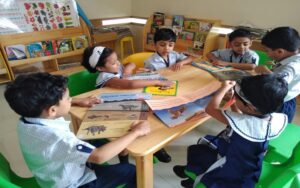Programs That Support Girls’ Education and Reduce the Gender Gap

A society becomes more prosperous and equal through education when every child receives opportunities without gender discrimination. Social and economic disparities in India create challenges for girls, but focused educational programmes, together with initiative-based projects, work to reduce gender inequality and establish sustainable transformations.
Girls’ education in India includes more than academic learning because it provides them with the space to develop independent thinking and self-assurance, which leads to personal independence. Various government schemes, together with non-profit organisations and public-private partnerships, have increased their support for this mission over multiple years.
The Fundamentals of Gender Gap in Education
The educational gender disparity remains active despite recent improvements in school attendance. Many families enforce domestic responsibilities on their young girls instead of sending them to school because they require their sons to continue their education. The combination of social expectations and early marriage, together with financial difficulties, frequently ends educational opportunities for girls.
This inequality has far-reaching effects. The educational dropout of girls leads to lifelong poverty and healthcare deprivation and denies them professional opportunities. National development depends on closing this gender gap because it creates a path toward an inclusive society for tomorrow.
Government-Led Educational Programmes for Girls
Various national schemes launched by India work to enhance girls’ educational opportunities. These educational programmes work to improve student enrollment numbers and educational quality standards, as well as student retention rates and empowerment levels.
-
Beti Bachao, Beti Padhao
This 2015 flagship programme works to eliminate gender-based discrimination while providing the girl child with protection and education and ensuring her survival. The programme increases public understanding of the value of girls’ education while persuading local populations to embrace fair opportunities for women.
-
Sukanya Samriddhi Yojana
The programme functions as a savings plan, but its main purpose is to provide long-term educational support for girl children. A girl child can open an account where the accumulated funds become available for her educational expenses when she reaches age 18.
-
Kasturba Gandhi Balika Vidyalaya (KGBV)
The scheme operates residential educational institutions for girls who belong to disadvantaged groups, especially in regions with limited female literacy rates. Students in these educational institutions receive all their education expenses free of cost, with additional benefits of meals and housing facilities.
-
National Scheme of Incentive to Girls for Secondary Education (NSIGSE)
The NSIGSE enables eligible girls who start class 9 to obtain financial aid until they finish their education in class 12. The programme specifically aims to support SC/ST girls through incentives to keep them enrolled until the completion of secondary education.
These educational programmes function as essential tools to enhance female literacy rates while pushing back early marriage practices, along with promoting family recognition of their daughters’ future potential.
The Role of NGOs in Supporting Girls’ Education
Non-governmental organisations (NGOs) join government initiatives to make essential contributions towards educational reform across India. Non-governmental organisations focusing on education in India operate at basic levels of society to close the implementation gap between laws and classroom practices.
The organisations actively seek out school dropout girls to reintegrate them into formal education. The organisations deliver remedial instruction, together with counselling and health education programmes, specifically for rural and tribal communities that lack proper educational services.
The educational programmes of many NGOs include both community-based learning centres and mobile school facilities that enable girls to access education without facing distance barriers. These programmes deliver maximum benefits to locations with inadequate transportation systems or security risks.
Some NGOs dedicate their efforts to developing educational training programmes, digital learning platforms, and curriculum development initiatives that improve teaching standards. These organisations work together with local schools as well as government bodies to expand their educational efforts.
How Sponsorships Make a Difference
The inability of families to afford education stands as the primary reason behind female students being kept from school. The power of educational sponsorship emerges as a solution to resolve these situations. Educational sponsors for a girl child in India children include funding their school attendance through payment of tuition fees and costs for uniforms, books, and transportation expenses.
Multiple online platforms enable both individuals and organisations to become sponsors for girl child education in India. Through sponsor a girl child in India programs, organisations enable disadvantaged girls to access proper care, together with essential educational support.
Specialised programmes enable sponsors to support orphan girl children in India through educational and nutritional assistance and emotional care. The safety and development of orphaned girls depend heavily on their ability to receive proper schooling.
The sponsor a girl child in India programme provides periodic updates about beneficiary progress, which establishes open and dependable connections between donors and those who receive support. When sponsors fund the education of a single girl, they assist in ending cycles of poverty, which leads to independent and leadership-focused growth.
Public-Private Partnerships and CSR Involvement
The private sector uses Corporate Social Responsibility (CSR) projects to create meaningful changes. The focus of corporate social responsibility initiatives in India is typically on providing education to girls.
Businesses collaborate with NGOs, along with local authorities, to fund educational projects while constructing schools and installing digital learning tools and clean sanitation systems. CSR activities funded by businesses improve access to education and develop better educational conditions for female students.
Businesses provide their female employees with internship positions, mentorship programmes, and career guidance sessions that help girls transition into life after graduating from school. These programmes establish education as a tool for equipping girls for their future roles in society.
Community Engagement and the Way Forward
Any successful programme requires the participation of its community members. Local leaders, together with teachers and parents, need to understand why female education matters. Permanent changes emerge when families, together with their communities, develop pride in educating their girls.
The transformation of community attitudes about female education can be achieved through public awareness initiatives, combined with local gatherings and success stories of educated women. Education needs to be recognised as a mission that belongs to both the government and the community.
The support system needs to extend its reach to include education levels above primary. Complete empowerment requires that girls receive secondary education, higher education, vocational training, and life-skills education. Every school needs to create spaces that protect girls and provide specialised services for their needs.
Conclusion: Every Girl Deserves a Chance
Society experiences its most significant improvement through female education. The learning of girls creates benefits that reach all directions, from their families through their communities until they impact the entire nation. Various initiatives, including government schemes, NGO for education in India efforts, sponsorships, and corporate initiatives, collaborate to bring this vision into existence.
The path toward education requires a sustained effort from every stride. Your support, whether through school backing, donation, or sponsor a girl child education in India, contributes to building an equal nation with educated citizens. We must unite to prevent any girl from being excluded while ensuring all children from all backgrounds receive learning opportunities for growth and leadership.







